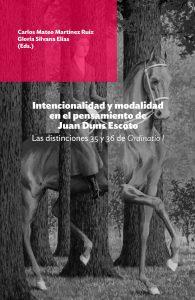Intentionality and modality in the thought of John Duns Scotus: Distinctions 35 and 36 of Ordinatio I
Keywords:
philosophy, medieval philosophy, Juan Duns EscotoSynopsis
This book is the result of collective work carried out by the Latin American Center for Scotist and Late Medieval Studies (CLEET), which brings together medieval philosophers from different countries and universities in Latin America. It focuses on the analysis of distinctions 35 and 36 of John Duns Scotus' Ordinatio I, in which the Scottish philosopher develops the different aspects involved in a radically contingent view of the universe. Both distinctions address a problematic framework traversed by questions of intentionality and modality, as well as the principled nature of divine intellect, the status of intelligible being, and the principle of possible being. Scotus' work in this particular section of his work (as in so many others) constitutes a kind of fractal that, the more closely it is examined, the more edges it reveals. The authors of this book address the main problems proposed here from different points of view and without concealing their interpretative differences.
Chapters
-
Introduction
-
Olivi and Escoto's criticisms of the thesis of the divine idea as imitability (Ord. I, d.35, 12 and 25)
-
Enrique de Gand and Duns Scotus on divine ideas. Notes on Ord. I d.35
-
Possibility, intelligibility, and instantes naturaeTextual and critical problems in Scotus' thesis
-
Escoto versus EscotoNotes on an unfinished dialogue
-
The epistemological status of imaginary entitiesThe dialogue between John Duns Scotus and Henry of Gand
-
Ens ratum et esse possibile in Ord. I, d.36: Can God only think the possible?
-
The “reduction” of the intelligible being to the divine mind(Ord. I, d.36,46-47)
-
The knowledge of creatures as an ‘extension’ (protendi) of divine self-knowledgeOrd. I, d.36,41-43
-
Appendix
-
References
-
Acronyms and abbreviations
-
Authors

Downloads
Published
Series
Categories
License

This work is licensed under a Creative Commons Attribution-NonCommercial-ShareAlike 4.0 International License.


